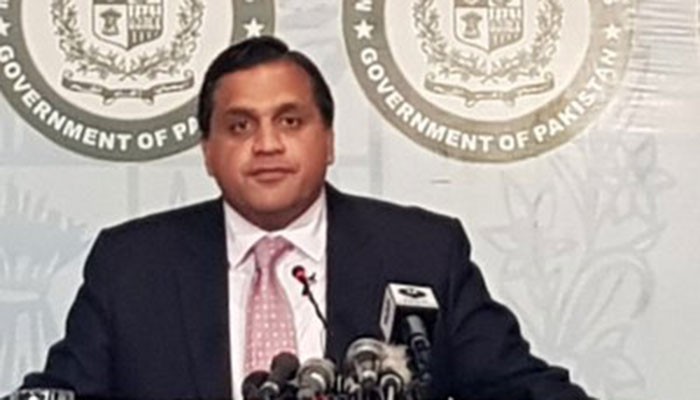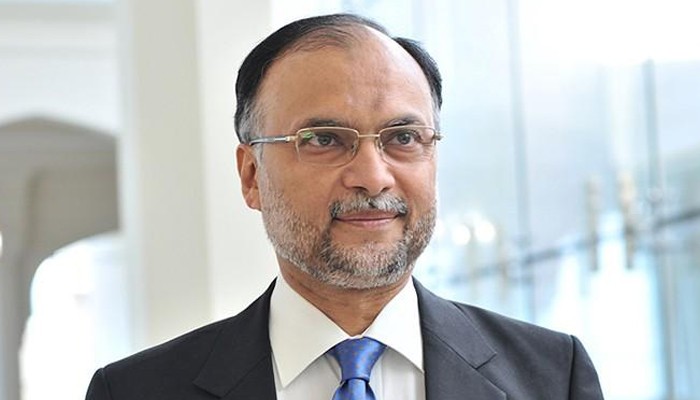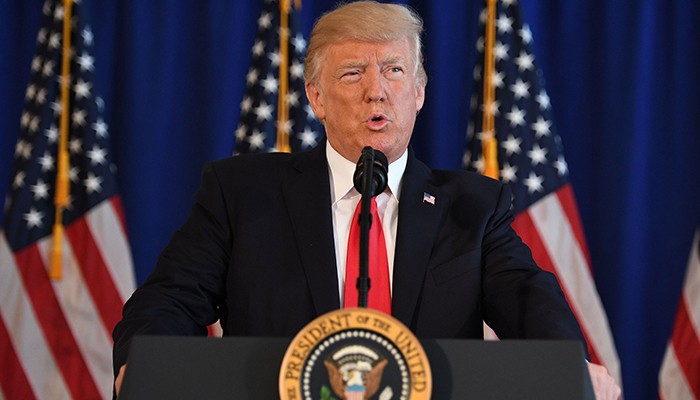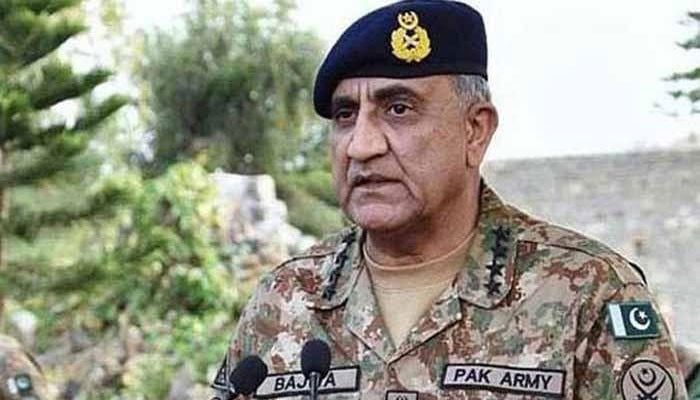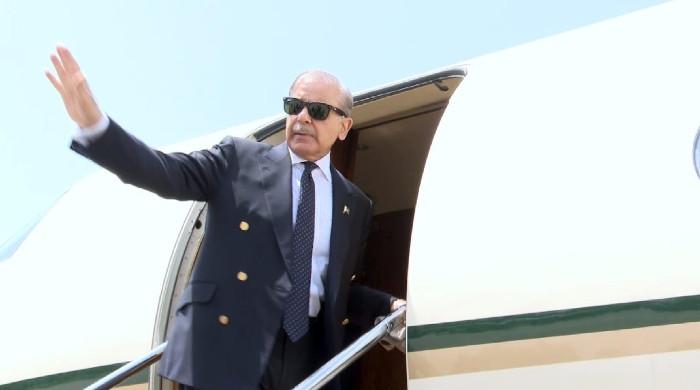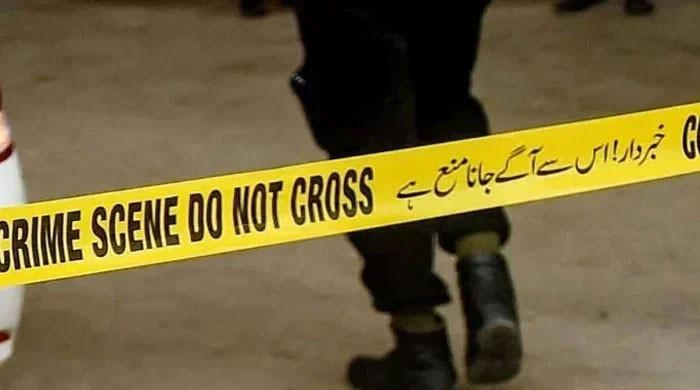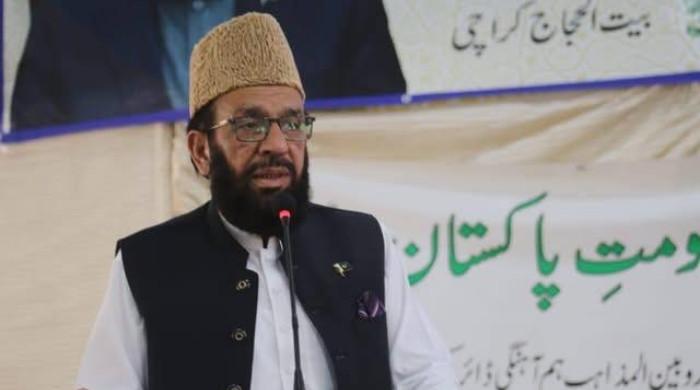US uses Pakistan like tissue paper: Imran Khan
PTI chief says it's important for India, Pakistan to resolve differences
April 16, 2018
Cricketer-turned-politician Imran Khan has said the United States uses Pakistan “like a tissue paper”.
“For Pakistan, unfortunately, the economic situation is not that strong right now. The country is actually going through an economic crisis. So American sanctions would be damaging. But I mean, is this justice? Is it fair? Is this how the US would use a country like a tissue paper and when it thinks it doesn’t need it anymore it just casts it away? I think it’s very immoral,” Imran said during an interview with RT’s Sophie Shevardnadze.
The Pakistan Tehreek-e-Insaf chairman’s statement came in response to a question regarding how damaging and dangerous it would be for Pakistan to be placed on the grey-list of the Financial Action Task Force (FATF).
Speaking about the US accusing Islamabad of supporting terrorism, Imran said, “I think, it’s very unfair to Pakistan, you know, a country that participated in the US war, and I repeat, a country that had nothing to do with 9/11, and a country that lost more people than any other country.”
“I mean, Pakistan lost more human beings, almost 70,000 dead, vast number of them were handicapped because of bomb blasts, for helping the Americans, for joining the American war and it brought the heaviest cost. And at the end the Americans today blame Pakistan and put sanctions against it, I think, this is the greatest travesty of justice. I think, you know, it is something which is inconceivable that the US would blame Pakistan for its failure in Afghanistan,” he added.
When asked why the Pakistani defence minister is asking the US to reconsider a cut of billions of dollars in security aid as ordered by President Donald Trump in January, Imran said. “My point of view is that this American aid has been very costly for Pakistan.”
“For getting whatever aid we did get in these 15 years, the damage done to Pakistan and participating the US war on terror has led to almost 70,000 people dead. It has devastated our tribal areas, the border areas, we have half of the population - we are talking about 3 to 4 million people - who were internally displaced. And the loss of the economy is about 100 billion dollars. So this small aid has been very costly. And the lesson learned, from Pakistan’s point of view, is to never fight someone else’s war. And people like us have always opposed it.”
Posed with the question if Pakistan should show actual accounting or if US should put forth proof of its statement that anywhere from 50% to 70% of the aid sent to Pakistan was misspent, wasted on kickbacks, bribes or even stolen, Imran said, “The aid given in proportion to the damage done in Pakistan by participating in the US war - there is no comparison.”
“The aid was what? They say, about 20 billion dollars, maybe 25 billion dollars. Pakistan has lost over a hundred billion dollars. Economy suffered. Investment suffered. The damage done through terrorism meant that foreign investors won’t come into Pakistan. Tourism collapsed in this country. Even today foreign cricket teams don’t come to play in Pakistan. So this country took a heavy punishment by participating in that war. And as I said, the money coming from that aid is a small pittance compared to what it cost to people of Pakistan,” he maintained.
Imran “absolutely agreed” with Pakistan’s foreign minister’s that the US has turned Islamabad into “a whipping boy” to distract from its failures in Afghanistan.
Agreeing that Washington is looking to single out Pakistan to deter criticism, the PTI chief said, “Just look at the facts. At one point there were 150,000 NATO troops in Afghanistan. And then the Afghan army is anything between 250,000 to 300,000. So you are talking about almost half a million armed forces in Afghanistan. And what the US blames Pakistan for is that two or three thousand insurgents coming from Pakistan to Afghanistan are the reason why they could not win the war in Afghanistan. “
‘US expects Pakistan to win the war they’ve badly lost in Afghanistan’
“Firstly, what would the US do to be on a collision course with Pakistan? The maximum leverage that the US has is to stop the aid. And, you know, Pakistan should try everything to keep the US happy,” he said when asked if the drop in American aid be countered by deals of Pakistan’s newest friends, like China or Saudi Arabia.
“But the problem is that the US expects Pakistan - the message it has made in Afghanistan - to somehow win the war which they’ve badly lost in Afghanistan. And when I say ‘lost’ I mean they haven’t won.”
“All the Taliban have to do to win the war is not to lose. So what the US expects Pakistan to do is what it has not been able to do to succeed in Afghanistan. And clearly Pakistan has limitations. And if Pakistan now… What they want to do is to take actions against these Taliban groups supposedly operating from Pakistan. Well, then they should tell us where these groups are. They are talking about the Haqqani network. At its peak the Haqqani network would have maximum 2,000 to 2,500 men in Pakistan. That surely cannot be the reason why they’ve lost and have not been able to win for 16 years,” he said.
Suggesting that the US will have to change its strategy in Afghanistan, Imran said, “What I feel is that the American policy of military actions, collateral damage... I don’t know whether you have seen, in Kunduz the bomb in madrasa killed a hundred children. Now that hundred children killed by the American bomb means that this will raise hatred in Afghanistan, and hatred means more recruits, and so it’s an ongoing circle: collateral damage, hatred, more recruits and an ongoing war. So the answer is that the US has to change its strategy. And that’s going towards dialogue and political solution.”
‘Brunt of anger against US was borne by Pakistan’
The PTI chief reiterated that Pakistan started off fighting the US war.
“I mean, there was no Al-Qaeda in Pakistan, there were no militant Taliban in Pakistan, and we didn’t have the terrorism. We had sectarian terrorism, but that was just nothing compared to what happened once we joined the US war on terror after 9/11. And then we had a spate of suicide bombings which was bigger than in any other country.”
“I mean, Pakistan suffered the sort of terrorism which no other country suffered. And there was a point in 2010-2011 when people were worried about the future of the country, we were falling apart. So it was thanks to the security forces that they eventually took this terrorism under control, which was because we were considered collaborators with the Americans. So all the anti-Americanism turned against Pakistan. People were attacking Pakistani security forces because they thought we were collaborating with the US. So the brunt of the anger against the US was borne by Pakistan,” he added,
'Trump’s praise of India is shocking'
Slamming the US president for applauding India’s role in the war on terror, while blaming Pakistan for the US not winning in Afghanistan and supporting terrorism, the PTI chief said, “Now this is exactly what India says about Pakistan.”
“And so therefore it was extremely hurtful for people of this country. They participated in the war that was not Pakistan’s war. There were no Pakistanis involved in 9/11. Al-Qaeda was in Afghanistan. There were no militant Taliban in Pakistan.”
When asked if he is saying that India is duping the US president into making decisions, Imran said, I don’t know what he has come up with, but it’s quite clear that the things he is saying is praising India whereas India didn’t make any sacrifices in this war on terror. What role did India play in this whole war? It’s Pakistan that took the burden, the suffering. And so to praise India is shocking for all of us. What has India contributed to this war on terror? And to give India a role in Afghanistan... India doesn’t have a border with Afghanistan.”
‘Donald Trump’s military solution to Afghanistan will fail’
Stating that there is no solution to bringing peace in Afghanistan other than all neighbors sitting together for a political situation, the PTI chief said, “Donald Trump doesn’t understand the history of Afghanistan. Afghanistan has a history, where they do not accept foreigners. They have always resisted foreign invasions.”
“And if he had even drawn any lessons from the Soviet invasion of Afghanistan, before that the British in the 19th century invasion of Afghanistan, he would know that this military solution which Donald Trump also has tried, is going to fail. The only solution, the only way to bring peace in Afghanistan is all the neighbours sit together and then come up with a political solution. There is no other solution apart from that,” he upheld.
‘Afghan peace is in Pakistan’s interest’
In response to a question regarding former Afghan Intelligence chief Amrullah Saleh’s comments that Pakistan views Afghanistan as a weaker state, and its relations with the country are driven by sheer greed and arrogance, the cricketer-turned-politician said, “This is very unfortunate.”
“Afghanistan needs Pakistan, and Pakistan needs peace and stability in Afghanistan. Otherwise Pakistan gets affected, especially along the border, the so-called the FATA, the tribal areas on the border of Afghanistan. So if you have problems in Afghanistan, instability which sadly has been there for 16 years, Pakistan gets affected.”
He continued, “So it’s in Pakistan’s interest that there is peace in Afghanistan. There is a problem, unfortunately, that the American policy of using a one-dimensional military solution to problems in Afghanistan has led not only to the longest war, but it has caused immense problems to Pakistan. Because the border with Afghanistan is the poorest, there was a free movement of people. And so what happens in Afghanistan affects Pakistan, so we need peace there, and I find these statements very sad.”
‘Pakistan should be helping in dialogue with Afghan Taliban’
Explaining the statements of some Afghan politicians and former Pakistani officials, including former president General (retd) Pervez Musharraf that Pakistan supports Taliban, Imran said, “Well, they are two different things. One is the so-called Taliban who attack in Pakistan, Pakistani forces, security forces. On the other hand, there is the Afghan Taliban who are fighting in Afghanistan.”
“Now what Pakistan says is that the terrorism coming into Pakistan is from Afghanistan, and Afghanistan is saying that the terrorism coming into Afghanistan, or that they cannot win it in Afghanistan, is because of the insurgents which is the Afghan Taliban going in from the Pakistani borders. My point is that clearly, first of all, there is a huge part of Afghanistan, some say 40%, some say 50%, which is not under the control of the Afghan government. So why would all these Taliban have to come to Pakistan if there is so much space available for them to operate within Afghanistan? That’s a number one point.”
“Number two, given that there is not going to be peace in Afghanistan unless there is a political settlement, so shouldn’t the Afghan government and the Americans be telling Pakistan to use their influence on the Afghan Taliban to get them to peace talks? So, surely, Pakistan’s role right now should not be trying killing more people, and creating more problems for a country, that has taken the most beating, most suffering in the war on terror. It should rather be helping in the dialogue and the peace process with its influence on the Afghan Taliban.”
He continued, “I think that Afghanistan has a very proud history, its people have suffered more than probably any other country because they’ve been suffering almost 40 years. They’ve been suffering this conflict, strive, instability and, so, if any people deserve peace, it’s the people of Afghanistan. And the only way that can be achieved is if all the neighbours sit at the table and bring the Afghan Taliban and the Afghan government at the table. That’s the only way.”
'Strength of TTP has been greatly reduced’
When asked if Pakistan is actually capable of getting its multiple militant groups under control, Imran said, “The strength of the Tehreek-e-Taliban Pakistan has been greatly reduced.”
“Ever since the American footprint reduced in Afghanistan, the level of terrorism went down in our country; no longer were the Pakistani security forces supposed to be collaborators of the Americans.”
He added, “The problem is in Afghanistan now. If Afghanistan is secure, settled, stable, then there would be peace in Pakistan. The problem is that because Afghanistan is unsettled we keep having attacks from Afghanistan on the Pakistani soil right now, because the Pakistani forces have control over the Pakistani areas more or less now. There are still incidents, but much fewer.”
‘Kashmiri struggle not fueled by Pakistan’
Regarding the Kashmir issue, the PTI chief said, “There has been a problem with Kashmir for the last 25 years. There are almost 600,000 to 700,000 Indian troops in Kashmir, there are violations of human rights, the local population has turned against the Indian army, the people have risen up against India in peaceful protests.”
“Now India blames Pakistan for what is going on in Kashmir. In Kashmir it’s an indigenous struggle. This is not a struggle fueled by Pakistan. Why don’t they give the Kashmiris the right to decide what they want, the democratic right to decide their future?”
“But they do not give them that right, they are using their forces to suppress that democratic freedom struggle and they blame Pakistan for what is going on in Kashmir which, again, is unfair.”
He lamented, “Now we have two fronts. One is India blaming all what is happening in Kashmir on Pakistan. The other is the US and the Afghan government blaming the instability in Afghanistan on Pakistan. That’s Pakistan’s problem right now. Unfortunately, we did not project that point of view on the diplomatic level. We have failed to really project what is happening in Kashmir and at the same time the sacrifices Pakistan has given in the US war on terror, and Pakistan is not responsible for what is happening in Afghanistan.”
‘Signals coming from India are extremely aggressive’
In response to a question regarding former Afghan president Hamid Karzai’s statement that Pakistan’s policy towards his country is defined by its rivalry with India, Imran said, “It’s because the signals coming from India are extremely aggressive.”
“Ever since Narendra Modi’s prime-ministership India’s stance with Pakistan is not only aggressive, but the whole foreign policy is to isolate Pakistan.”
He added, “And some of us in this country think that they even wouldn’t mind Pakistan splitting, breaking away Waziristan from the rest of the country. So clearly Pakistan is worried that if they face India on two fronts, meaning, you know, along Eastern border and then if Afghanistan becomes an Indian satellite, which is a big challenge for the Pakistan security forces, then Pakistan is struggling on two fronts. So it’s out of this insecurity that Hamid Karzai is right - the policy is determined by the security issues.”
‘Important for India, Pakistan to resolve differences’
Questioned about India and Pakistan’s military plans for a conflict and Islamabad’s readiness to use nuclear weapons on the Indian subcontinent, Imran responded, “That is the nightmare scenario.”
“And that is why it is very important to resolve our differences; India and Pakistan are to sit at the table and have some sort of a roadmap to resolve the issues. The problem is, I repeat again, Prime Minister Narendra Modi who since coming to power has the policy that is extremely aggressive and it is hostile towards Pakistan.”
“Obviously Pakistan is much smaller than India, and it has made the country very insecure. The government is insecure, our security establishment is insecure. Bearing in mind that we are two nuclear-armed countries the best way is if we will sit down and resolve our differences. But, unfortunately, so far India’s response has been arrogant and very aggressive. And whatever happens, the moment any sort of talks start or have (started) in the past, one terrorist incident derails the whole process and we are back to square one.”
He suggested, “What we really need is a strong determined leadership in both countries, a leadership that has the ability to take the pressure from that small lobby in both countries that doesn’t want peace. And whatever happens, whatever little incident happens, the two countries stick to the roadmap of peace. And the peace has to be a resolution of the Kashmir issue. So, unfortunately, at the moment I don’t see that dialogue happening, but in the future it is the only solution that the two countries sit together and resolve this issue of Kashmir, so that we can live side by side as civilised neighbours. “
